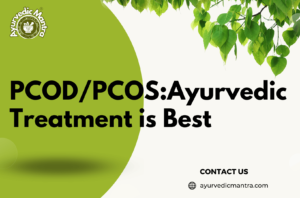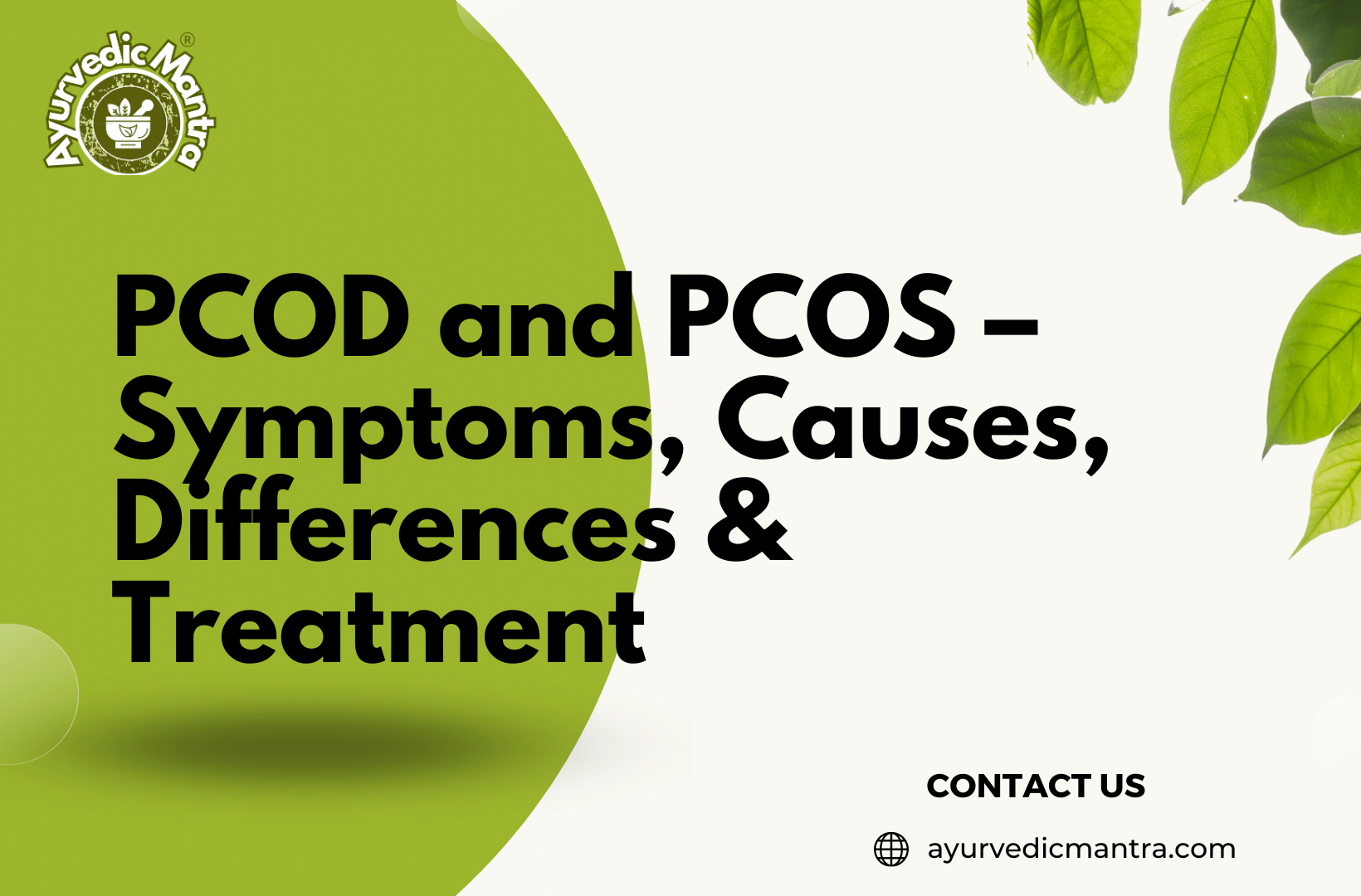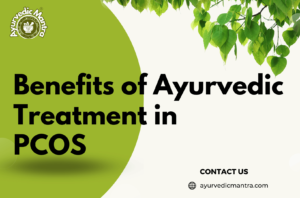
PCOD/PCOS: Ayurvedic Treatment is Best
Introduction Polycystic Ovary Disorder (PCOD) or Polycystic Ovary Syndrome (PCOS) is a common endocrine disorder affecting millions of women worldwide. It leads to hormonal imbalances,

If you or someone you know has been experiencing irregular periods, fertility issues, or other hormonal imbalances, you might have encountered terms like PCOD and PCOS. Polycystic Ovary Disorder (PCOD) and Polycystic Ovary Syndrome (PCOS) are two common hormonal disorders that affect many women worldwide. While they share some similarities, they are not in the same condition. This comprehensive article will delve into the symptoms, causes, differences, and available treatments for PCOD and PCOS, providing valuable insights to understand these conditions better.
PCOD, or Polycystic Ovary Disorder, is a hormonal disorder that affects the ovaries, leading to enlarged ovaries with multiple small cysts. These cysts are fluid-filled sacs that can disrupt the normal functioning of the ovaries and result in hormonal imbalances. The exact cause of PCOD is not fully understood, but it is believed to be influenced by genetic and environmental factors.
On the other hand, PCOS, or Polycystic Ovary Syndrome, is a more complex hormonal disorder affecting the ovaries and the entire endocrine system. In PCOS, the hormonal imbalance leads to the overproduction of androgens (male hormones) in the female body, which can cause various health issues.
The exact cause of PCOD is unknown, but it is thought to involve a combination of genetic and environmental factors. Insulin resistance and inflammation are also believed to play a role in developing PCOD.
Similarly, the precise cause of PCOS remains unclear, but it is thought to be linked to insulin resistance and hereditary factors. Elevated insulin levels stimulate the ovaries to produce excess androgens, leading to the symptoms associated with PCOS.
The most significant difference between PCOD and PCOS is the presence of ovarian cysts. PCOD is characterized by multiple small cysts on the ovaries, while PCOS may or may not involve the presence of such cysts.
While both conditions involve hormonal imbalances, the specific hormones affected differ. PCOD is primarily associated with imbalances in female hormones like estrogen and progesterone, while PCOS is linked to elevated androgen levels.
PCOS, a systemic disorder, can impact various systems in the body due to its influence on multiple hormones. In contrast, PCOD’s effects are more localized to the ovaries.
PCOS is generally considered to have more severe symptoms due to its broader impact on the endocrine system, while PCOD symptoms might vary in intensity from person to person.
Treatment for PCOD focuses on managing the symptoms and addressing the underlying hormonal imbalances. Lifestyle changes like a balanced diet, regular exercise, and stress management are crucial in managing PCOD. In some cases, hormonal therapy may be prescribed to regulate menstrual cycles and reduce androgen levels.
Managing PCOS involves a multifaceted approach. Lifestyle modifications, including a healthy diet and exercise, are essential in controlling insulin levels and androgen production. Additionally, hormonal contraceptives, anti-androgen medications, and insulin-sensitizing drugs may be prescribed to manage PCOS symptoms.
In conclusion, PCOD and PCOS are distinct hormonal disorders affecting women, with varying symptoms and underlying causes. While PCOD involves enlarged ovaries with multiple small cysts and hormonal imbalances, PCOS is a more complex systemic disorder with elevated androgen levels. Proper diagnosis, followed by lifestyle adjustments and medical treatments, can significantly improve the quality of life for individuals with these conditions. If you suspect you might have PCOD or PCOS, it is essential to consult a healthcare professional for accurate diagnosis and personalized treatment options.
Frequently Asked Questions (FAQs) about PCOD and PCOS
PCOD stands for Polycystic Ovary Disorder, and PCOS stands for Polycystic Ovary Syndrome. While both conditions involve hormonal imbalances, PCOD is characterized by enlarged ovaries with multiple small cysts, while PCOS is a more complex disorder affecting the entire endocrine system. Additionally, PCOS may or may not involve the presence of ovarian cysts, which is a defining feature of PCOD.
The symptoms of PCOD and PCOS can vary, but some common ones include irregular menstrual cycles, excessive hair growth on the face and body, acne, and weight issues. In PCOD, irregular periods and fertility problems are prominent, whereas absent periods and hirsutism (abnormal hair growth) are more prevalent in PCOS. Both conditions may also lead to mood swings and mood disorders.
The exact causes of PCOD and PCOS are not fully understood, but they are believed to involve a combination of genetic and environmental factors. Insulin resistance is also thought to play a role in both conditions. In PCOD, hormonal imbalances disrupt the normal functioning of the ovaries, leading to cyst formation. In PCOS, elevated insulin levels stimulate the ovaries to produce excess androgens (male hormones), leading to the various symptoms associated with the syndrome.
Diagnosing PCOD and PCOS involves a comprehensive medical history, symptoms, and physical examination assessment. Hormonal blood tests, including androgen levels and insulin levels, are usually performed to confirm hormonal imbalances. Ultrasound imaging of the ovaries may be conducted to detect cysts and their characteristic appearance. It is essential to consult a healthcare professional for an accurate diagnosis.
Yes, both PCOD and PCOS are treatable conditions. Treatment focuses on managing symptoms and addressing the underlying hormonal imbalances. Lifestyle modifications, such as a balanced diet, regular exercise, and stress management, play a significant role in managing both conditions. In some cases, hormonal therapy, including birth control pills, may be prescribed to regulate menstrual cycles and hormone levels. Anti-androgen medications and insulin-sensitizing drugs are also used in managing PCOS.
While PCOD and PCOS can be managed effectively with appropriate treatment and lifestyle changes, they cannot be cured entirely. Treatment focuses on improving symptoms, promoting hormonal balance, and preventing complications. Early diagnosis and proactive management can help individuals lead a healthy and fulfilling life despite these conditions.
Some individuals find relief from PCOD and PCOS symptoms by adopting specific natural remedies alongside medical treatments. A balanced diet rich in whole foods, low in refined sugars, and high in fiber can aid in managing insulin levels and weight. Regular physical activity can also help improve insulin sensitivity and overall well-being. Herbal supplements like cinnamon, spearmint, and fenugreek have been studied for their potential benefits in managing hormonal imbalances. Still, it’s essential to consult a healthcare professional before trying any natural remedies.
Yes, both PCOD and PCOS can have an impact on fertility. Irregular menstrual cycles and ovulation issues in PCOD may make conceiving challenging. In PCOS, hormonal imbalances and lack of regular ovulation can also lead to fertility problems. However, with appropriate medical interventions and lifestyle changes, many women with PCOD or PCOS can still achieve pregnancy.
Both PCOD and PCOS are associated with certain long-term health risks. Women with these conditions may have an increased risk of developing type 2 diabetes, high blood pressure, and cardiovascular diseases. Additionally, untreated PCOS can lead to difficulties in weight management and may increase the risk of endometrial cancer. Proper management and regular check-ups with healthcare professionals are essential to address these risks effectively.
The exact causes of PCOD and PCOS are not fully understood, so it is challenging to prevent these conditions entirely. However, adopting a healthy lifestyle, including a balanced diet, regular exercise, and stress management, can help reduce the risk of hormonal imbalances and related complications. Early detection and proactive management can also make a significant difference in minimizing the impact of these conditions on overall health.

Introduction Polycystic Ovary Disorder (PCOD) or Polycystic Ovary Syndrome (PCOS) is a common endocrine disorder affecting millions of women worldwide. It leads to hormonal imbalances,

Introduction Losing weight is a journey that requires dedication, consistency, and self-care. While there are numerous weight loss techniques out there, not all of them

Polycystic Ovary Syndrome (PCOS) is a hormonal disorder that affects millions of women worldwide. It can lead to various health complications, such as irregular periods,

In recent years, Ayurveda, an ancient system of natural healing originating from India, has gained significant popularity as an alternative approach to treating various health

आजकल वजन बढ़ने और चर्बी की वृद्धि होने की समस्या एक आम समस्या बन गई है। बढ़ते वजन और अतिरिक्त चर्बी के कारण न केवल

प्रस्तावना: आजकल वजन बढ़ने और ओबेसिटी की समस्या एक आम समस्या बन गई है। बढ़ते वजन के कारण न केवल शारीरिक समस्याएं होती हैं, बल्कि
